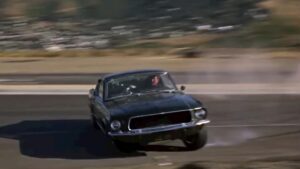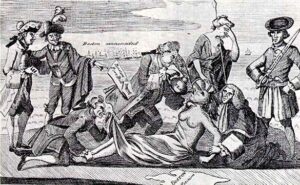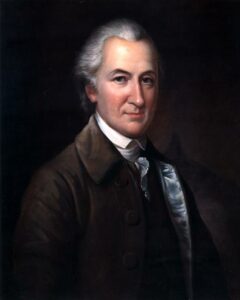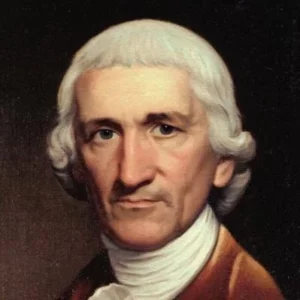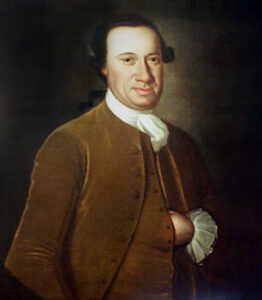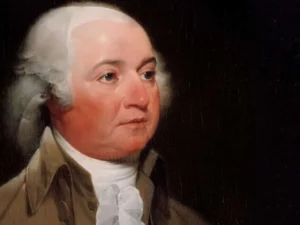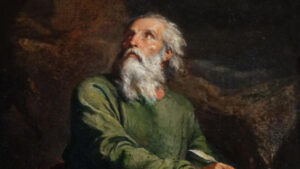Americanism Redux
June 20, your today, on the journey to the American Founding, 250 years ago, in 1774
Your hands grip the wheel. Feels good. Going a bit faster than you’re used to or than you like. That’s okay. You’re dealing with it. The faster pace, it turns out, is manageable. You can still enjoy the countryside out the window.
Then, something slams the accelerator and the whole thing rockets ahead.
The wheel shakes. The engine shakes. And while you’re shaking freakishly hard, the truth is that you’re really no longer gripping the wheel for control, you’re hanging, clinging, seizing it to appear to be in control.
You glance outside. Everything blurs.
Yet somehow—how can it be?—a voice tells you the whole thing is still accelerating. The blurs blend to a linear blob, the shaking is seconds away from dismantlement.
* * * * * * *
Was the summer solstice only a year ago? Good Lord.
British colonial life was much the same after all the years before. A few exceptions here and there, but much the same overall. Across the Atlantic, members of British Parliament attended to a problem that the insiders all talked about. A reputedly important public-private organization, the British East India Company, was failing and needed governmental help. They got it.
Now, a year later, we’re talking and thinking about ideas scarcely uttered before. We’re taking action and planning action no one had dreamed of considering. And we’re in a non-stop, ever-accelerating loop of actions, reactions, counter-reactions, reprisals, retaliations, and on and on. And here we are.
How far have we gone?
Know this: in June’s edition of The Royal American Magazine for British colonial readers, Paul Revere publishes his latest political cartoon-drawing-sketched commentary. He draws a group of lecherous, perverted, and demented older men holding down a Native woman wearing a dress; they’re forcing tea down her throat, insulting her while pinning her to the ground, and prying her legs apart to see up her short dress. It’s a scene of political rape and public humiliation.
That’s where we are.
* * * * * * *
(John Dickinson)
“What never happened before, has happened now.”
“The Country people have so exact a knowledge of Facts, and of the Consequences attending a surrender of the Points now in Question, that they are if possible, more zealous than the Citizens who lie in the direct Line of Information.”
“Doubt not, that every thing bears a most favorable aspect. Nothing can possibly throw Us into a pernicious Confusion, but one Colony’s breaking the line of Opposition, by advancing too hastily before the rest.”
“The one that dares to betray the Common Cause by rushing forwards, contrary to the Maxim of Discipline established by Common Sense and Experience of Ages, will inevitably and utterly perish.”
So writes on June 20, today 250 years ago, John Dickinson of Philadelphia to Josiah Quincy Jr of Boston. Wealthy, esteemed, seasoned, and regarded as the most knowledgeable essayist on pro-colonial rights back in the ’60s, Dickinson knows the new pace of change is like lightning and hopes that hard-learned lessons will keep it directed, guided, controlled. As quick becomes fast becomes blinding fast, John Dickinson will be expected to play a key role as a colonial-rights leader.
* * * * * * *
(Charles Thomson)
Dickinson’s words refer to events of the last few days in Philadelphia where, as another of the town’s residents put it, “a large and respectable meeting of the freeholder and other respectable inhabitants” (should we say the word “respectable” again just to reassure ourselves?) met and approved six resolves. Two resolves expressed support for Boston, while the remaining four touched positively on aspects of a necessary multi-colony “general congress” to meet as soon as convenient. This fellow writer, Charles Thomson, also described his belief that Virginia was now the vital colony in the effort: “ancient”, “respected” (yes, again), and “animated” in defending “our lives, liberty, and property.” Led by Virginia, Thomson announced to Peyton Randolph, a key leader there, there will be no choice “but to UNITE OR DIE.”
The large Philadelphia crowd that met selected a smaller subset as a “Committe of Correspondence” that would essentially function as a steering committee. Called the “43”, this smaller group included John Dickinson and Thomas Willing as co-chairs—respectable, of course—and listed the rest of the “43” by name, but, intriguingly, specificed a “carpenter” and a “miller”, along with a preacher, among the men.
Unlisted and unmentioned is life: reality suggests that the “43” has all sorts of sub-subsets as well.
The dual-track arrangement of a broader crowd of voter-participants combined with a narrower set of steward-activists has, by the start of summer 1774, become common for the colonial-rights movement in American communities. It will tighten even further to a third track if the proposed multi-colony “general congress” is organized.
* * * * * * *
(John Hanson)
They’re on these exact tracks in Frederick, colony of Maryland, today, 250 years ago. Townspeople from Frederick meet; John Hanson calls a public gathering to order in the county courthouse. He’s 53-years old, a successful farmer, merchant, and office-holder who’d moved to the county five years ago.
A solid believer in colonial rights, Hanson offers a steady hand from the front of the room. Hanson knows how to frame a debate, listen to arguments, and arrive at group decisions. Also, he’s proven his willingness to push the edge in colonial protest. He’s unafraid of imperial punishment. He doesn’t know it now but in less than a decade, Hanson will be elected as the first President of the American Republic in world history.
In a straightforward Hanson-ish sort of way, the Frederick group of Frederick County produces the Frederick Resolves. These Resolves call for a freeze of all economic relations between the colony and Britain. They include an unusual addition: no interaction between our community and any communities that refuse to embrace the freeze. One last add-on is a twist on the economics: no lawsuits allowed to recover debt in this turmoil, unless the person who owed the debt either tried to disappear or refused to post bond. They’re covering all the bases in Frederick.
The meeting ends with two more votes. The group votes for nine people to represent the county at a colony-wide meeting next month in Annapolis, and selects six people to begin functioning as a Committee of Correspondence for the colonial-rights movement. From many to some to few.
The tracks are laid down in Frederick.
* * * * * * *
(John Adams)
“There is a new, and a grand Scene open before me—a Congress. This will be an assembly of the wisest Men upon the Continent, who are Americans in principle, i.e., against the Taxation of Americans, by Authority of Parliament.”
“I feel myself unequal to this Business. A more extensive Knowledge of the Realm, the Colonies, and of Commerce, as well as of Law and Policy, is necessary, than I am Master of.”
What can be done? Will it be expedient to propose an Annual Congress of Committees to Petition?…what will such Consultations avail? Deliberations alone with not do. We must petition, or recommend to the Assemblies to petition or—(left blank purposely by the writer)”
“The Ideas of the People, are as various, as their Faces. One thinks, no more petitions, former having been neglected and despised. Some are for Resolves—Spirited Resolves—and some are for bolder Councils.”
“I will keep an exact Diary, of my Journey, as well as a Journal of the Proceedings of the Congress.”
So writes on June 20, today 250 years ago, John Adams in his diary. He’s a delegate, especially chosen as part of representation of Massachusetts in the proposed but as yet undated and unplaced “Congress.” He’s hoping to meet the greatly respected and respectable John Dickinson.
* * * * * * *
(the prophet Isaiah)
Back in Boston and Massachusetts, epicenter of crisis, British Redcoats are arranging final details inside their encampment on Boston’s town green. The masts, sails, pennants, and flags of British naval vessels are seen in the port. A resident prints a letter in a local newspaper: “The Inhabitants of this Province claim no more than the Rights of Englishmen.”
Samuel Adams looks closely over the shoulder of the colony’s legislature. He’s deeply satisfied that legislators voted this week to create the Boston Committee of Overseers to help organize aid and assistance to residents affected by the blockaded port. The Overseers, in turn, vote yesterday, on June 19, to establish a Committee of Ways and Means to receive and distribute donations. Adams and his colleagues wait “till the sense & advice of our Sister Colonies shall be known.”
Ebenezer Parkman, the Congregational minister in Westborough near Boston, has had quite a week. Seven days ago a group of colonial-rights supporters showed him the “Solemn League and Covenant” written by Samuel Adams, Thomas Young, and others. It was a strict economic boycott of Britain coupled with harsh public enforcement mechanisms. Parkman was less than thrilled with the plan in large part because he didn’t see Christian principles in it. Since then, Parkman has been recruited by the group; they offered to add a “day of prayer and fasting” to the plan. They also urged him to attend more meetings about the Solemn Leage. Parkman learned that the new British governor, General Thomas Gage, had dissolved the colony’s legislature (as Dunmore had done in Virginia). That fact, along with the promise of a fast-and-prayer day, convinces Parkman to join the colonial-rights cause as an active member and, most importantly to him, spiritual advisor.
Grounded in his new position within the colonial-rights movement, Parkman preaches his next sermon around Isaiah, 10:3–“And what will ye do in the day of visitation, and in the desolation which shall come from far? To whom will ye flee for help? And where will ye leave your glory?”
* * * * * * *
(too hot in Halifax)
Andy and Elizabeth Miller had hoped to relax for several days. Halifax, colony of North Carolina, is starting to be boiling hot and some time away at the Burke’s plantation in Hillsborough would have been nice. Andy can’t see how it would happen, though. Too much work to be done, especially in a complex and highly disputed land deal involving multiple people and families. No—insert Andy’s heavy sigh here—it’s best to stay at home and Halifax. He expects to receive a message from Governor Josiah Martin, maybe with an invitation to visit him at the governor’s home. Who knows: perhaps he can take Elizabeth with him while he makes like friends with the governor, a potential resource for solving this land problem. It’s a headache in the heat—one wrong move and the whole land case he’s working on blows up in his face.
Andy can’t envision what would make this any more complicated.
* * * * * * *
The speed and the shaking are so great you can’t see, you can’t think, you can’t do much more than simply hang on.
Also
(the fortress-castle)
In the shadow of a fortress-castle on the hill, Maria waits for her next student. When the child arrives, Maria will sit with them on the wooden bench and their piano lesson will begin. 22-year old Maria is a skilled pianist. Her reputation around the community of Salzburg in Austria has helped the Mozart family become well-known in central Europe. When wealthy families think about having their children learn to play the piano, they’ll often think of the Mozarts as the best source for the skill.
Maria’s 18-year old brother Wolfgang wants her to assert more independence in the family, especially from their father. Maria loves her brother, though she can’t bring herself to follow his advice. Independence, it seems, is beyond reality, as is the music that she will eventually compose and, sadly, disappear. For her, no sound of music in the future of Salzburg.
For You Now
Roaring forward, in danger of flying apart or out of control, you’ll have time one thought every few seconds.
Is there something I can do?
Will we stay in one piece?
Where are we?
Can anything slow us down or stop us?
I get the feeling that the people in today’s stories are not far from asking these questions.
And hardly anyone was ready for this a year ago.
That’s a key point from today’s Redux. The unimaginable should not be the ignorable. To extend the unimaginability of a drawing like Paul Revere’s to the assumption that it and everything it involved simply won’t or can’t happen may be wrong-headed. Don’t let the fact that you can’t imagine something happening become your justification for why it won’t happen. You certainly cannot be a leader in that way.
Another is the set of things done or said or thought in the effort to find control of a suddenly light-speed moment. Dickinson wants to think that people will remember long-ago lessons. Adams wants to believe that only the continent’s “wisest men” will convene for making the best decision; he hopes he’s up to their task. Hanson and others in the Frederick meeting want to have confidence in a two- or three-track arrangement to strain irrational moods and outbursts out of rational choices and decisions. Perhaps one of these people will be accurate. You never know. However, and this you can know, if or when the overall environment changes, the things you accepted as likely to be accurate may have no purchase whatsoever in a new human climate.
Use them as an example. I asked you to remember the context of a year ago to show how far things had traveled. Now go forward instead of backward; think ahead a year from now and ask yourself how many people are genuinely ready for (and understanding of) war and battle in their own backyard?
Suggestion
Take a moment to consider: what is shockingly true now that wasn’t true a year ago?

